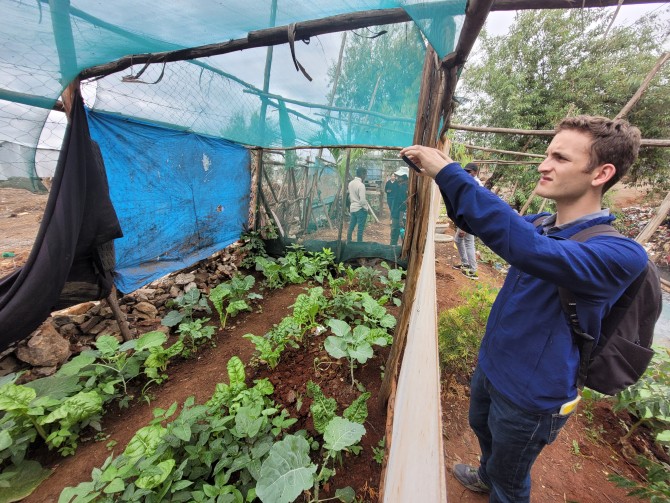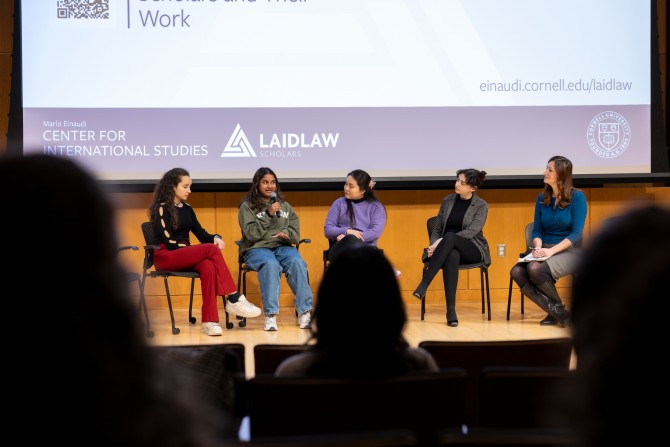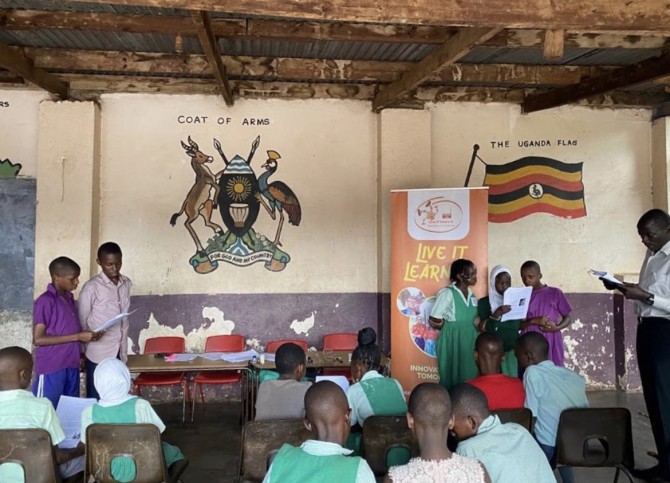This summer, Laidlaw scholar Eli Newell ' 24 collaborated with researchers and educators in Kenya to explore how human waste streams can benefit agricultural systems by creating fertilizers and feeds.
News directly from Cornell's colleges and centers
Laidlaw scholars build global communities
By
The Laidlaw Leadership and Research Program at Cornell develops students into ethical leaders and global citizens. The program, hosted by the Mario Einaudi Center for International Studies, strengthens students’ research and leadership skills over two years through work on international research projects, leadership training, participation in hands-on learning experiences, and global networking.
Students can apply to join the next cohort of scholars until the application deadline of January 24, 2024.
Eli Newell ’24
International Agriculture and Rural Development, College of Agriculture and Life Sciences (CALS)
Eli Newell spent his second summer in the Laidlaw Scholars Program focused on initiatives to support a circular bionutrient economy in Kisumu, Kenya. Newell collaborated with fellow scholars Jeff Kang’acha and Jensen Njagi on the project.
Alongside Charles Midega of Poverty & Health Integrated Solutions (PHIS), he examined the nutrient flow in Lake Victoria – a lake plagued by nutrient pollution. They explored ways to divert sewage and other waste from Lake Victoria by transforming them for agricultural use in fertilizers and feeds. The work was a continuation of research completed in his first summer under the mentorship of Rebecca Nelson, a professor in the CALS School of Integrative Plant Science.
“Participating in the Laidlaw Scholars Program has been a great privilege of my time at Cornell,” said Newell. “My peers I’ve met in the program are ambitious in their fields and curious about each other's — my closest friends today are other Laidlaw scholars. Also, the two-year duration of the scholarship has allowed me to be intensely involved with my professor’s research program at Cornell and with her partner in Kenya, introducing me to the best colleagues and most rewarding experiences.”
Many of Newell’s classes gave him a jumpstart to the skills he would need to implement in his fieldwork, including Swahili language, experiment design, GIS mapping, and statistical analysis.
“Nutrient flows from rural agriculture to urban diets and sewage threaten the lake’s fishery, jeopardizing the sustainability of both the land and lake systems and the prosperity of those who depend on them. When these nutrients are managed through circular economies that return them to agriculture, the land will be greener and the lake will be cleaner.“
Krupa Sekhar ’25
Global and Public Health Science, College of Human Ecology
Krupa Sekhar spent her summer in Sarawak, Malaysia for a leadership-in-action experience called “Cultural Heritage Mapping and Accurate Internet Speed Mapping in Malaysia.”
Sekhar developed a cultural heritage mapping website that enables local communities to share their culture and traditions and local businesses to amplify their work, while strengthening community relationships.
“A big part of my research was interacting with communities, learning from them, and improving my project so it could best serve them,” said Sekhar. “Holistic research takes feedback and continually iterates upon itself, and I love that this process makes the website a living document. Not only are community members able to add their heritage to the website, the structure and scope of the website is constantly evolving based on the feedback we get from users.”
“I loved getting to interact with indigenous and local communities. Their mindsets and approaches to life are extremely different from mine and learning about their traditions, getting to experience their culture of community, and understanding the diversity of backgrounds in Sarawak was very fulfilling,” she said.
Sekhar found opportunities to explore beyond Sarawak, too. “I definitely loved visiting the longhouses near Mukah with my advising professor and other researchers. I got to learn not only about the longhouse community but also about all the community-based research my fellow travelers were working on,” she said. Tariq Zaman, a professor at the University of Technology in Sarawak, was her advisor while abroad.
“I also loved solo traveling around Sibu and Kuching, because it was the first solo travel experience I had. I realized that when you're alone you can really do whatever you want, whenever you want – I went to midnight food markets, mountains at dawn, beaches, temples, cafes, riverside pagodas and more.”
Mia Wangari Adriko ’26
Global Development and Agricultural Sciences, CALS
Mia Wangari Adriko is a part of the 2023 cohort of scholars who spent their first summer of the program doing international research. Her research project addresses educational inequality in Ugandan primary schools and sets out to create a more inclusive learning environment. She found that low-income students lacked the resources needed to learn remotely. With help from community members such as CALS Professor Terry Tucker and graduate student mentor Jose Bustos, she designed the “Live it, Learn it” novel to aid kids in Uganda with their academic endeavors.
“It's been extremely fulfilling to implement my findings as I carry out my research because I get to succeed and fail in real-time,” Wangari Adriko said. “I'm also extremely grateful for my ongoing relationship with my community partners. It's great to have open access to any and all opportunities to build the exact skillset that I need to be of service.”
“I love that my research is so flexible. Working on this community development project has taught me how to adjust, and adjust again. I'm glad that my research acts as an opportunity to watch classroom lessons come to life.”
She also found a supportive community of fellow scholars while completing her work. Weekly roundtable discussions provided a space to share ideas about global citizenship and community-engaged work.
“This summer I lived with a couple of other Laidlaw scholars in the Wait Co-op and that was awesome! My favorite memories have got to be the time we spent out on the roof, on grocery trips, and in the greater Ithaca area exploring waterfalls, ice cream spots, and restaurants.”
Lemachi Enweremadu is a social media assistant for Global Cornell.
Media Contact
Get Cornell news delivered right to your inbox.
Subscribe



